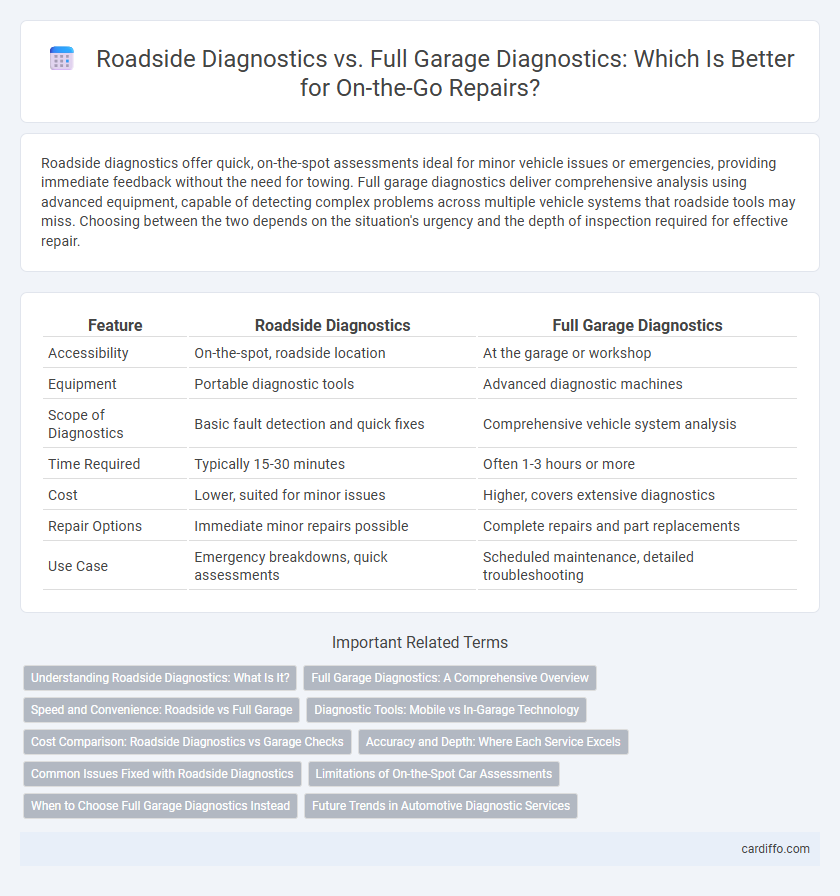Roadside diagnostics offer quick, on-the-spot assessments ideal for minor vehicle issues or emergencies, providing immediate feedback without the need for towing. Full garage diagnostics deliver comprehensive analysis using advanced equipment, capable of detecting complex problems across multiple vehicle systems that roadside tools may miss. Choosing between the two depends on the situation's urgency and the depth of inspection required for effective repair.
Table of Comparison
| Feature | Roadside Diagnostics | Full Garage Diagnostics |
|---|---|---|
| Accessibility | On-the-spot, roadside location | At the garage or workshop |
| Equipment | Portable diagnostic tools | Advanced diagnostic machines |
| Scope of Diagnostics | Basic fault detection and quick fixes | Comprehensive vehicle system analysis |
| Time Required | Typically 15-30 minutes | Often 1-3 hours or more |
| Cost | Lower, suited for minor issues | Higher, covers extensive diagnostics |
| Repair Options | Immediate minor repairs possible | Complete repairs and part replacements |
| Use Case | Emergency breakdowns, quick assessments | Scheduled maintenance, detailed troubleshooting |
Understanding Roadside Diagnostics: What Is It?
Roadside diagnostics involves on-the-spot vehicle assessment using portable diagnostic tools to quickly identify common issues such as battery failure, tire problems, or engine malfunctions. Unlike full garage diagnostics, which rely on advanced, stationary equipment for comprehensive vehicle analysis, roadside diagnostics prioritize speed and convenience to restore vehicle functionality without the need for a workshop visit. This approach is critical for immediate fault detection, enabling timely repairs and reducing vehicle downtime on the road.
Full Garage Diagnostics: A Comprehensive Overview
Full garage diagnostics provide an extensive and in-depth analysis of a vehicle's systems using advanced diagnostic tools and software, allowing for precise identification of complex issues. These comprehensive diagnostics cover engine performance, transmission, braking systems, and electronic components, ensuring a thorough evaluation beyond surface-level symptoms. Unlike roadside diagnostics, full garage diagnostics enable detailed data logging and software updates, facilitating optimal vehicle maintenance and repair accuracy.
Speed and Convenience: Roadside vs Full Garage
Roadside diagnostics provide rapid assessment using portable equipment, enabling immediate identification of common vehicle issues without the need to tow the car. Full garage diagnostics offer comprehensive analysis with advanced tools and expert technicians, suitable for complex or less common problems but often require longer wait times. The trade-off between speed and convenience favors roadside services for urgent, on-the-spot fixes, while full garage diagnostics ensure thorough evaluation when time allows.
Diagnostic Tools: Mobile vs In-Garage Technology
Mobile diagnostic tools enable quick, on-site roadside detection of vehicle issues using compact scanners and wireless interfaces, offering immediate data access and real-time troubleshooting. In-garage diagnostics employ advanced, stationary equipment with comprehensive system integration for deeper analysis and calibration, often requiring specialized software and extensive databases. The choice between mobile and in-garage diagnostic technologies hinges on the need for portability versus the demand for detailed, multi-system vehicle assessments.
Cost Comparison: Roadside Diagnostics vs Garage Checks
Roadside diagnostics typically cost between $50 and $150, offering quick and convenient assessments for minor vehicle issues without requiring a tow. In contrast, full garage diagnostics range from $100 to $250 or more, delivering comprehensive system evaluations and advanced troubleshooting using specialized equipment. Opting for roadside diagnostics can save money on initial checks, but full garage diagnostics provide in-depth analysis essential for complex repairs.
Accuracy and Depth: Where Each Service Excels
Roadside diagnostics provide quick, on-the-spot assessments ideal for identifying common issues such as battery failure or tire pressure problems with moderate accuracy. Full garage diagnostics use advanced equipment and comprehensive software, offering greater depth by evaluating complex systems like engine performance, transmission faults, and electronic control units. While roadside services excel in speed and convenience, garage diagnostics ensure pinpoint accuracy and thorough analysis for complete vehicle health evaluation.
Common Issues Fixed with Roadside Diagnostics
Roadside diagnostics effectively identify common vehicle issues such as battery failure, tire pressure problems, and minor electrical faults, enabling quick and targeted repairs without the need for a full garage visit. This approach leverages advanced diagnostic tools to pinpoint sensor malfunctions, engine misfires, and fuel system irregularities, reducing vehicle downtime significantly. While full garage diagnostics offer comprehensive system checks, roadside diagnostics address frequent, immediate problems faster, optimizing repair time and cost efficiency.
Limitations of On-the-Spot Car Assessments
On-the-spot roadside diagnostics provide quick, preliminary insights but often lack the depth of full garage diagnostics due to limited access to advanced tools and comprehensive testing equipment. These assessments may miss complex engine or electronic issues that require in-depth analysis available only in a controlled garage environment with specialized diagnostic machines. Reliance solely on roadside evaluations can lead to incomplete problem identification, increasing the risk of misdiagnosis and delayed repairs.
When to Choose Full Garage Diagnostics Instead
Full garage diagnostics are essential when complex issues such as engine faults, electrical system failures, or advanced sensor malfunctions arise that exceed the scope of roadside diagnostic tools. These comprehensive diagnostics utilize specialized equipment, including engine analyzers, oscilloscope testing, and computer system interfaces, providing in-depth analysis and precise fault identification. Choosing full garage diagnostics ensures accurate repair recommendations and prevents misdiagnosis in situations requiring thorough vehicle system assessments.
Future Trends in Automotive Diagnostic Services
Future trends in automotive diagnostic services highlight the increasing adoption of advanced roadside diagnostics leveraging AI-powered mobile analyzers for real-time vehicle assessment. These innovations enable faster fault detection and predictive maintenance compared to traditional full garage diagnostics, reducing downtime and enhancing service efficiency. Integration of cloud-based platforms and IoT connectivity will further streamline remote diagnostics, enabling seamless data sharing between roadside units and centralized repair centers.
Roadside diagnostics vs full garage diagnostics Infographic

 cardiffo.com
cardiffo.com